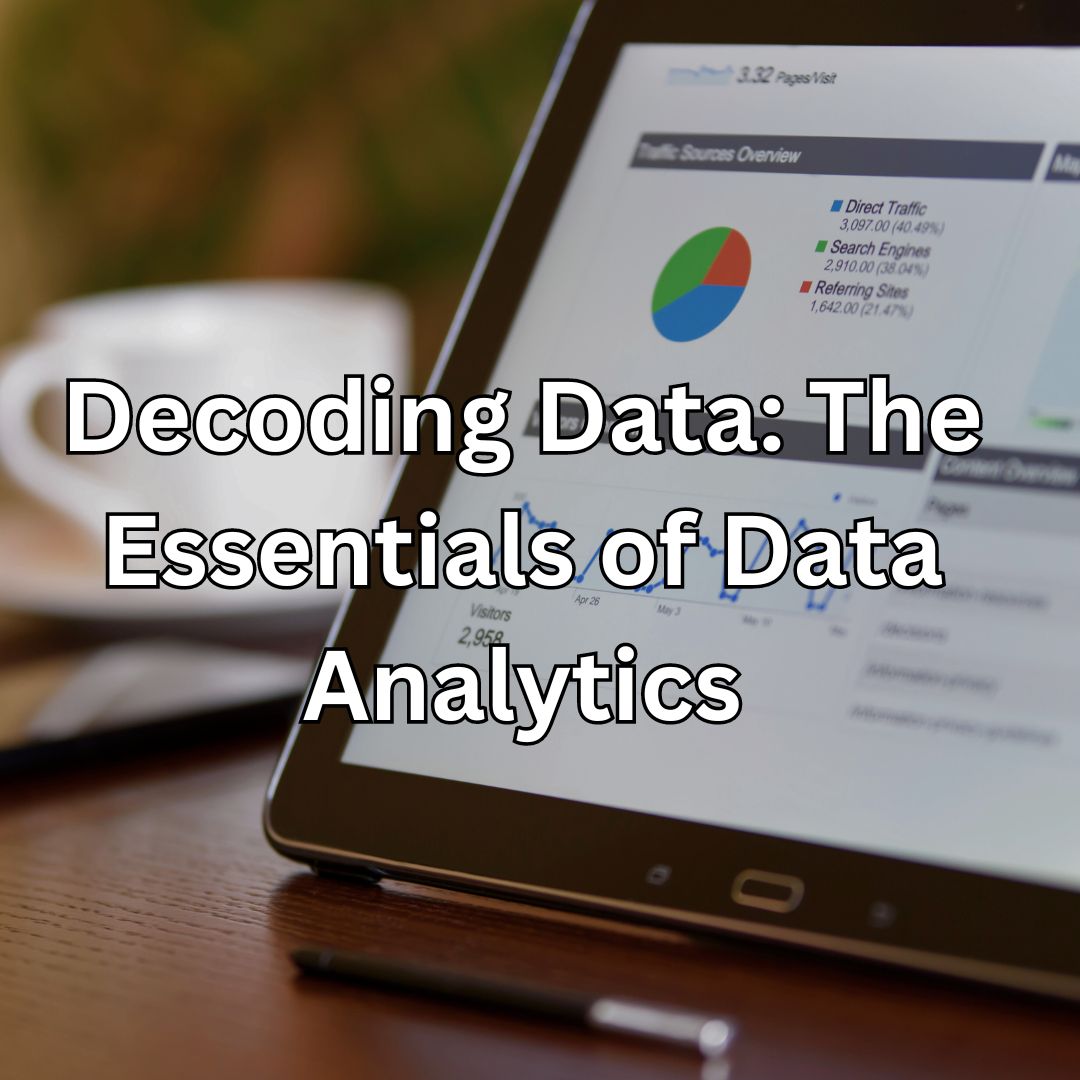
Introduction
In today’s digital age, data has become the cornerstone of decision-making across industries. From predicting market trends to optimizing supply chains, businesses rely heavily on data analytics to gain insights and drive strategic initiatives. Decoding data is not just about understanding numbers; it’s about unraveling patterns, uncovering correlations, and extracting actionable insights that can steer businesses towards success. In this comprehensive guide, we will delve into the essentials of data analytics, exploring key concepts, techniques, and real-world applications.
Understanding Data Analytics
Data analytics is the process of examining large datasets to uncover hidden patterns, correlations, and other meaningful insights. It involves a combination of statistical analysis, machine learning algorithms, and domain expertise to extract valuable information from raw data. By leveraging advanced analytical tools and techniques, organizations can gain a competitive edge by making data-driven decisions.
Exploratory Data Analysis (EDA)
EDA is a crucial step in the data analytics process, involving the initial exploration of datasets to understand their underlying structure and characteristics. It includes techniques such as summary statistics, data visualization, and correlation analysis to uncover trends and relationships within the data.
Predictive Analytics
Predictive analytics utilizes historical data and statistical algorithms to forecast future trends and outcomes. By analyzing past behavior and patterns, predictive analytics can help businesses anticipate customer behavior, identify potential risks, and make proactive decisions to mitigate them.
Prescriptive Analytics
Prescriptive analytics goes beyond predicting future outcomes to recommend actions that can optimize decision-making processes. By leveraging advanced algorithms and optimization techniques, prescriptive analytics provides actionable insights to improve business performance and achieve strategic objectives.
The Role of Data in Business
In today’s digital economy, data is hailed as the new currency, driving innovation, efficiency, and growth. Businesses across industries are harnessing the power of data analytics to gain a deeper understanding of their customers, optimize operations, and unlock new revenue streams.
Customer Insights
Data analytics enables businesses to gain valuable insights into customer preferences, behavior, and purchasing patterns. By analyzing customer data from various touchpoints, organizations can personalize marketing campaigns, improve customer satisfaction, and drive loyalty.
Operational Efficiency
Data analytics plays a vital role in optimizing operational processes, improving efficiency, and reducing costs. By analyzing operational data in real-time, businesses can identify bottlenecks, streamline workflows, and enhance productivity across the organization.
Strategic Decision-Making
Data-driven decision-making has become a cornerstone of strategic planning and execution for businesses. By leveraging data analytics, organizations can identify market trends, competitive threats, and growth opportunities, enabling them to make informed decisions that drive long-term success.
Real-World Applications
Data analytics has a wide range of applications across various industries, from retail and healthcare to finance and manufacturing. Let’s explore some real-world examples of how data analytics is transforming businesses.
Retail
In the retail industry, data analytics is used to optimize inventory management, forecast demand, and personalize the customer experience. Retailers analyze sales data, customer demographics, and market trends to tailor promotions, optimize pricing, and enhance customer satisfaction.
Healthcare
In healthcare, data analytics is revolutionizing patient care, clinical research, and population health management. Healthcare providers leverage electronic health records (EHRs), medical imaging data, and wearable devices to improve diagnosis accuracy, optimize treatment plans, and reduce medical errors.
Finance
In the finance industry, data analytics is used for fraud detection, risk management, and algorithmic trading. Financial institutions analyze transaction data, market trends, and customer behavior to detect anomalies, mitigate risks, and identify profitable investment opportunities.
FAQs
What is data analytics?
Data analytics is the process of examining large datasets to uncover hidden patterns, correlations, and other meaningful insights that can inform decision-making.
How does data analytics benefit businesses?
Data analytics helps businesses gain valuable insights into customer behavior, optimize operational processes, and make informed, data-driven decisions that drive growth and innovation.
What are some common techniques used in data analytics?
Some common techniques used in data analytics include exploratory data analysis (EDA), predictive analytics, and prescriptive analytics.
Can data analytics be applied to different industries?
Yes, data analytics has applications across various industries, including retail, healthcare, finance, manufacturing, and more.
What are the key steps in the data analytics process?
The key steps in the data analytics process include data collection, data cleaning, exploratory data analysis, modeling, evaluation, and deployment.
How can businesses get started with data analytics?
Businesses can get started with data analytics by defining clear objectives, identifying relevant data sources, selecting appropriate analytical tools, and building the necessary infrastructure and capabilities.
Conclusion
Data analytics is a powerful tool that can help businesses unlock the full potential of their data and gain a competitive edge in today’s digital landscape. By leveraging advanced analytical techniques and technologies, organizations can uncover valuable insights, optimize decision-making processes, and drive innovation and growth. Embracing data analytics is not just a competitive advantage; it’s essential for survival in an increasingly data-driven world. Enrolling in Data Analytics Training in Gurgaon , Nashik , Chandigarh and all locations in India can further empower individuals and businesses to harness the transformative capabilities of data analytics effectively.






